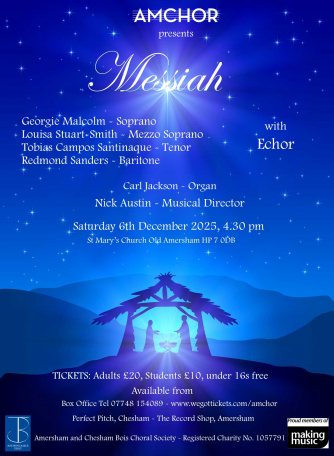Details
St Mary's Church
Church Street
Amersham
Buckinghamshire
HP7 0DB
England
Programme
George Frideric Handel – Messiah, HWV 56
Performers
Georgie Malcolm – soprano
Louisa Stuart-Smith – mezzo-soprano
Campos Santinaque Tobias – Baritone / Tenor
Redmond Sanders – baritone
Echor
Amersham and Chesham Bois Choral Society
Programme Note
Handel’s Messiah is one of the most beloved and enduring choral works in the Western classical tradition. Composed in just 24
days in 1741, this oratorio sets scriptural texts compiled by Charles Jennens to music, drawing from both the Old and New
Testaments. Rather than telling a continuous story, Messiah is structured in three parts: the first explores the prophecy and birth of
Christ, the second reflects on His suffering, death, and resurrection, and the third celebrates the promise of eternal life and final
victory over sin and death.
What sets Messiah apart is its ability to blend spiritual depth with musical brilliance. Handel uses simple, memorable melodies and
rich harmonies to express a wide range of emotions—from joyful anticipation in “For unto us a child is born,” to the solemn pathos
of “He was despised.” Perhaps the most famous movement is the triumphant “Hallelujah” chorus, which has become a tradition in many performances for audiences to stand during its rousing strains.
Despite its strong Christian themes, Messiah transcends religious boundaries through its powerful music and universal messages
of hope, redemption, and renewal. Though it was originally intended for performance during Lent or Easter, it is now most
commonly performed at Christmas.
Handel's masterful writing for voices and orchestra, his dramatic pacing, and his ability to convey deep emotion without excessive
ornamentation have ensured the work's popularity for over 280 years. Messiah has been performed by small chamber groups and massive choirs alike, in concert halls, churches, and public spaces around the world.
Handel himself is said to have remarked, "I did think I did see all Heaven before me, and the great God Himself" while writing
the Hallelujah chorus—perhaps explaining why this remarkable work still moves listeners today.

 Your events at Classical Events
Your events at Classical Events

